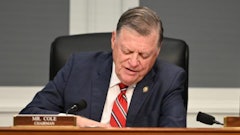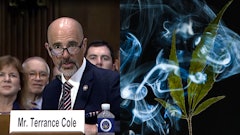
Many cannabis industry stakeholders had hoped the Drug Enforcement Administration (DEA) would issue a final rule to reschedule cannabis under the Controlled Substances Act (CSA) before the November election. But that won’t be the case.
DEA Administrator Anne Milgram, who holds the keys to granting an administrative law judge (ALJ) hearing before issuing a final rule, decided to schedule such a hearing for Dec. 2. The hearing is to “receive factual evidence and expert opinion regarding” the Department of Justice’s (DOJ) proposed rule to transfer cannabis from Schedule I to Schedule III under the CSA. In addition, the hearing may be continued from day to day or recessed to a later date without notice.
Although the Dec. 2 hearing notice isn’t scheduled to be published in the Federal Register until Aug. 29, the DEA made a pre-published version available on Aug. 26. “DEA is committed to conducting a transparent proceeding,” Milgram wrote.
This decision by Milgram comes after industry insiders like Curaleaf Chairman and CEO Boris Jordan said in late July, “I don’t think there’s going to be an ALJ [hearing].” It also comes after pro-legalization U.S. House Rep. Nancy Mace, R-S.C., said this week, “I’m assuming [cannabis rescheduling] will happen right before the election.” Jordan and Mace made these statements during broadcasts of The Dales Report.
Had Milgram not granted an ALJ hearing, it would have put the DEA’s final rule for cannabis rescheduling on the fast track. However, it also would have opened up the chances for litigation to delay or block the implementation of a final rule.
RELATED: Rescheduling Update: How Long Is the Wait? What’s Next?
While Milgram did not name an ALJ to oversee the hearing in the pre-published notice, the presiding officer will be granted full authority to “conduct a fair hearing, to take all necessary action to avoid delay, and to maintain order,” Milgram wrote.
Milgram’s notice comes after the DOJ’s proposed rescheduling rule that was published May 21 in the Federal Register—which Milgram did not sign off on—drew more than 43,000 responses during a 60-day public comment period that ended July 22.
“DEA has not yet made a determination as to its views of the appropriate schedule for marijuana,” according to the May 21 notice of proposed rulemaking (NPRM).
This week’s pre-published notice from Milgram to hold an ALJ hearing did not include a list of participants or how many parties would be allowed to participate. However, any person “adversely affected or aggrieved by” the DOJ’s proposed rule who wishes to participate can file a written notice of intention to participate for the DEA’s review.
According to Milgram, those who previously filed a request for a hearing or to participate in a hearing before the initial June 20, 2024, date provided in the NPRM do not need to file another request.
“DEA received numerous requests for a hearing in response to the NPRM,” Milgram wrote in the pre-published notice.
While it’s unclear how many people/organizations previously requested a hearing, prohibitionist group Smart Approaches to Marijuana (SAM) has been public about its request. SAM President Kevin Sabet suggested this week that his organization will, in fact, participate even though Milgram wrote that she has yet to determine the participants.
“The announcement that DEA will hold an administrative hearing on the rescheduling of marijuana is a huge win in our fight to have this decision guided by medical science, not politics,” Sabet said in a public statement Aug. 26. “We will seek to use this hearing to spell out in detail how marijuana continues to fail to meet the criteria to be rescheduled.”
More specifically, Sabet said he believes cannabis cannot be removed from Schedule I because it does not have “currently accepted medical use” in the U.S.—a key finding that must be made for any drug to be removed from a Schedule I listing.
The U.S. Department of Health and Human Services (HHS) disagrees with Sabet’s position.
President Joe Biden initiated the rescheduling process in October 2022 when he directed his cabinet to review the plant’s classification. The HHS recommended to the DEA in August 2023 that cannabis be relisted to Schedule III after conducting a scientific and medical evaluation for cannabis. The HHS determined that cannabis does have “currently accepted medical use” in the U.S. and, therefore, does not belong among Schedule I drugs like heroin, LSD and ecstasy.
The HHS scientific evaluation, in part, is what led to the DOJ’s proposed rule to reschedule cannabis to Schedule III. However, the DEA has not endorsed the currently accepted medical use standard for cannabis and holds the final authority on the determination. Attorney General Merrick Garland signed off on the 92-page notice of that proposed rule instead.
“DEA has maintained an active review of the scientific literature addressing marijuana with a focus on how it relates to the scientific and medical evaluation and informs any updates to the eight-factor analysis,” according to the May 21 notice in the Federal Register.
While some cannabis-motivated voters may have hung their hats on whether the DEA would issue a final rule before the November election, this week’s news of the Dec. 2 ALJ hearing means the rescheduling process will likely outlive the Biden administration.
Those wishing to participate in the Dec. 2 hearing must:
- State with particularity the interest of the person in the proceeding;
- State with particularity the objections or issues concerning which the person desires to be heard; and
- State briefly the position of the person regarding the objections or issues.
These requests must be made within 30 days of the notice’s publication.
“After the deadline to request to participate in the hearing, I will assess the notices submitted and make a determination of participants,” Milgram wrote. “Following that assessment, I will designate a presiding officer to preside over the hearing.”
According to Milgram’s pre-published notice, the presiding officer’s authorities include the power to:
- hold conferences to simplify or determine the issues in the hearing or to consider other matters that may aid in the expeditious disposition of the hearing;
- require parties to state their position in writing;
- sign and issue subpoenas to compel the production of documents and materials to the extent necessary to conduct the hearing;
- examine witnesses and direct witnesses to testify;
- receive, rule on, exclude, or limit evidence;
- rule on procedural items; and
- take any action permitted by the presiding officer under DEA’s hearing procedures and the Administrative Procedures Act.
“Comments on or objections to the proposed rule submitted under 21 CFR 1308.43(g) will be offered as evidence at the hearing, but the presiding officer shall admit only evidence that is competent, relevant, material, and not unduly repetitive,” Milgram wrote.



























